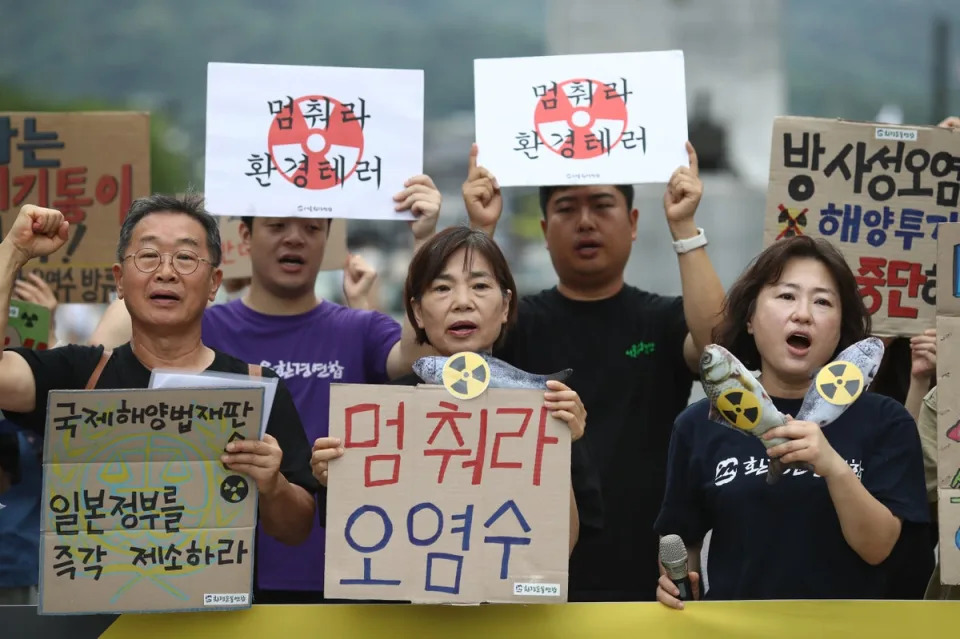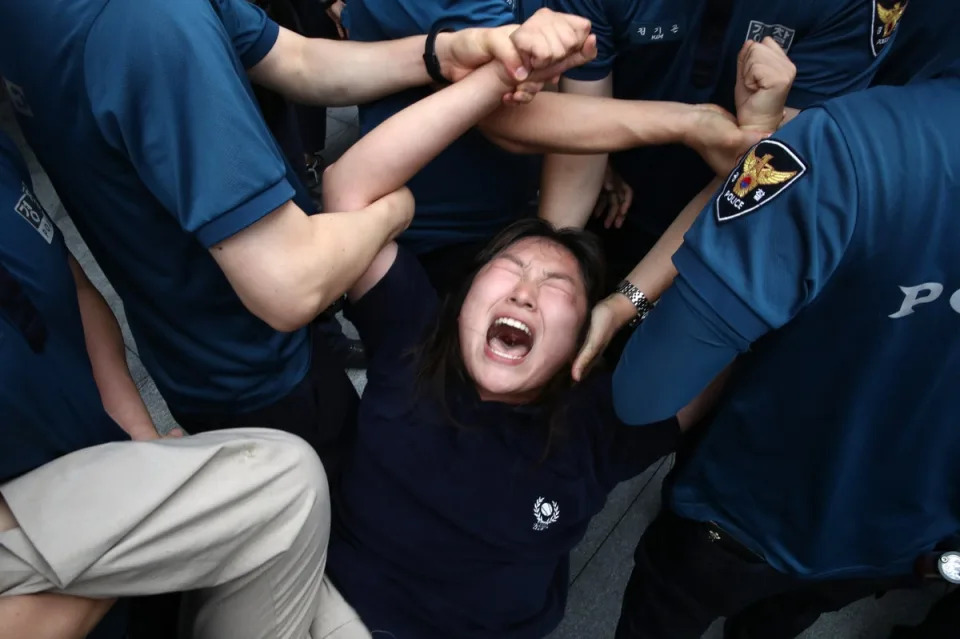Lydia Chantler-Hicks
Thu, 24 August 2023

Japan begins releasing treated radioactive water from Fukushima nuclear power plant into Pacific Ocean
Japan has begun releasing treated radioactive water from the wrecked Fukushima nuclear power plant into the Pacific Ocean.
The controversial, decades-long project began on Thursday, amid fresh and fierce criticism from China which slammed it as “selfish and irresponsible”.
Approved two years ago by the Japanese government and greenlighted by the UN nuclear watchdog last month, the discharge is a key step in a dauntingly long and difficult process of decommissioning the Fukushima Daiichi plant, including the removal of molten fuel.
The power plant was destroyed in March 2011 when a massive 9.0 magnitude earthquake generated powerful tsunami waves that caused the meltdowns of three of its reactors.
Plant operator Tokyo Electric Power (Tepco) said the release began at 1.03 pm local time (5.03am UK) and it had not identified any abnormalities with the seawater pump or surrounding facilities.
But China reiterated on Thursday its firm opposition to the plan and said the Japanese government had not proved the legitimacy of the water discharge.

South Korean protesters rally against the Japanese government's decision to release treated radioactive water into the Pacific Ocean (Getty Images)
“The Japanese side should not cause secondary harm to the local people and even the people of the world out of its own selfish interests,” China’s foreign ministry said in a statement.
China has said it would also take measures to protect the marine environment and public health, and would step up monitoring of radiation levels in its waters following the discharge.
Tokyo has in turn criticised China for spreading “scientifically unfounded claims.”
It maintains the water release is safe, noting that the International Atomic Energy Agency (IAEA) has also concluded that the impact it would have on people and the environment was “negligible”.
The release of the wastewater has unsettled other countries in the region, with Cook Islands Prime Minister Mark Brown saying that while science supported Japan’s decision, the region may not agree on the “complex” issue.
Japanese fishing groups, hit with years of reputational damage from radiation fears, have long opposed the plan. They fear it will lead to a loss of sales, including from export restrictions to major markets.
Hong Kong and Macau - both Chinese-ruled regions - are set to implement a ban on Japanese seafood from regions including the capital Tokyo and Fukushima starting on Thursday.
South Korean Prime Minister Han Duck-soo said import bans on Fukushima fisheries and food products will stay in place until public concerns were eased.
The process of pumping more than one million tonnes of treated water from the power plant is expected to take decades.

A South Korean university student is detained by police officers during a protest against the move by Japan (Getty Images)
The water will be released in smaller portions initially and with extra checks. The first discharge totalling 7,800 cubic metres - the equivalent of about three Olympic swimming pools of water - will take place over around 17 days.
According to Tepco test results released on Thursday, that water contains about up to 63 becquerels of tritium per litre, below the World Health Organization drinking water limit of 10,000 becquerels per litre. A becquerel is a unit of radioactivity.
Japan will conduct monitoring around the water release area and publish results weekly, the environment minister said.
Tepco expects the process of releasing the wastewater - currently totally more than 1.3 million metric tons - to take about 30 years.
Civic groups have launched protests in Japan and South Korea, although South Korea’s government has said its own assessment found no problems with the scientific and technical aspects of the release.
Ahead of the release, a few dozen protesters gathered in front of Tepco’s headquarters in Tokyo holding signs reading “Don’t throw contaminated water into the sea!”
Japan releases water from Fukushima nuclear plant into Pacific

AFP
Wed, 23 August 2023
Japan began releasing wastewater from the crippled Fukushima nuclear plant into the Pacific Ocean on Thursday despite angry opposition from China and local fishermen.
The start of the discharge of around 540 Olympic swimming pools' worth of water over several decades is a big step in decommissioning the still highly dangerous site 12 years after one of the world's worst nuclear accidents.
Live video provided by plant operator TEPCO showed two engineers clicking on computer mouses and an official saying -- after a countdown -- that the "valves near the seawater transport pumps are opening".
Monitors from the UN atomic watchdog, which has endorsed the plan, were due to be on site for the procedure, while TEPCO workers were scheduled to take water samples later on Thursday.
Japanese officials have repeatedly insisted the wastewater release is safe.
But China's environment ministry on Thursday blasted Japan as "extremely selfish and irresponsible", saying it would "track and study" the impact of the release on its waters.
Ahead of the operation, about 10 people held a protest near the site and around 100 others gathered outside TEPCO headquarters in Tokyo, AFP journalists said.
"It's like dumping an atomic bomb in the ocean. Japan is the first country that was attacked with an atomic bomb in the world, and the prime minister of the country made this decision," said Kenichi Sato, 68.
- Multiple meltdowns -
With around 1,000 steel containers holding the water, TEPCO has said it needs to clear space for the removal of highly dangerous radioactive nuclear fuel and rubble from the wrecked reactors.
Three of the reactors at the Fukushima-Daiichi facility in northeastern Japan went into meltdown following a massive earthquake and tsunami that killed around 18,000 people in 2011.
Since then, TEPCO has collected 1.34 million cubic metres of water that was contaminated as it cooled the wrecked reactors, along with groundwater and rain that has seeped in.
TEPCO will carry out four releases of the treated water from Thursday until March 2024. The first will last about 17 days, though it is expected to take around 30 years for all of the wastewater to be discharged.
Japan says that all radioactive elements have been filtered out except the tritium, levels of which are harmless and lower than what is discharged by operational nuclear power plants -- including in China.
This is backed by most experts.
"When released into the Pacific, the tritium is further diluted into a vast body of water and would quickly get to a radioactivity level which is not discernibly different from normal seawater," said Tom Scott from the University of Bristol.
- Sushi safety -
Not everyone is convinced, with environmental group Greenpeace saying that the filtration process is flawed, and China and Russia suggesting the water be vaporised and released into the atmosphere instead.
China has accused Japan of treating the Pacific like a "sewer", and even before the release, Beijing banned food imports from 10 out of 47 Japanese prefectures and imposed radiation checks.
Hong Kong and Macau, both Chinese territories, followed suit this week.
Restaurants in Beijing and Hong Kong serving sushi and sashimi are already reeling from the restrictions.
"About 80 percent of the seafood products we use come from Japan," Hong Kong caterer Jasy Choi, who runs a small kitchen for takeaway Japanese food, told AFP.
Analysts said that while China may have genuine safety concerns, its strong reaction is also motivated at least in part by its economic rivalry and frosty relations with Japan.
The South Korean government, which is seeking to improve ties with Japan, has not objected, although many ordinary people are worried and have staged protests.
Social media posts in China and South Korea have included false claims about the release, including doctored images of deformed fish with claims they were linked to Fukushima.
People in the Japanese fishing industry oppose the release, worrying that governments and consumers will shun their seafood.
"I am worried about the future," protestor Ruiko Muto, 70, told AFP in Miharu near the power plant.
"We can't pass on the responsibility of what happened during our generation to the generation of our children and to future generations."
burs-stu/smw
No comments:
Post a Comment